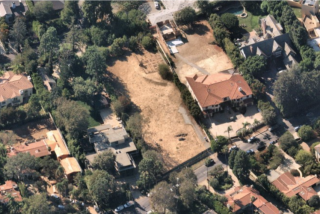Where a Tree Grows
- Share via
I have no idea what kind of tree it is, only that it’s sad and scrawny and seems oddly out of place where it is.
Antonio Colocho planted it when he was 10 in an effort to beautify the frontyard of their modest stucco home on the edge of the Harbor Freeway.
“It was only a few inches high when he planted it,” his mother said as we stood before her house in South-Central L.A. “Now look at it.”
In the five years of its existence the tree has grown to about eight feet in height, reaching out with thin branches across a fence and onto the sidewalk itself.
To Marleny Colocho, the tree represents her son and deepens the sadness she feels at his disappearance. She doesn’t know whether Antonio, who is just 15, is alive or dead, and her anguish is deep.
She only knows that even though he had threatened to kill both her and her husband, she wants him back to love him, to care for him and to cure him.
A tiny woman of 34 with the determination of a Cape buffalo, she believes that inside her troubled son is the kid she once knew who helped clean the house, cared for a sick sister, got top grades in school and was regarded as the son everyone wished they had.
Then it all fell apart and Antonio, raging against life, vanished into the embracing vastness of the city and hasn’t been seen since.
His goodbye was a letter left at a cemetery that said he was going to the Angeles National Forest to kill himself.
*
Sitting in the sparsely furnished living room of her home, Colocho considered the roots of despair that altered Antonio’s behavior and sent him hurtling into the night.
She believes they centered on her daughter, Otilia, who died a year ago of leukemia. She was three years younger than Antonio and he adored her.
“Otilia got sick when she was 4 and died when she was 11,” Colocho said, “Antonio cared for her all those years. He was so sweet and attached to her, almost like a father.”
The trauma of her death affected the whole family deeply, including two other boys, Mario, 8, and Ricardo Jr., 9, and her husband, Ricardo, a cement mason.
Colocho noticed an almost instant change in Antonio after Otilia’s death. At first, he wouldn’t leave his mother’s side and then, as the weeks and months passed, he began a descent into anger and isolation. His grades tumbled and he began missing school. Often he would lock himself in his room and refuse to come out.
In art class where he once excelled, he painted his face white, telling his mother he wanted to hide from the way people were looking at him. Eventually, he was suspended from school for disrupting class.
Searching for answers, Colocho took him to psychologists and tried group counseling in school, but nothing seemed to work. “He said to me, ‘My sister’s gone and nothing is the same,’ ” Colocho recalled. “He said, ‘I feel as though I’m not here anymore.’ Then he began banging his head against a wall and crying.”
*
In a moment of calm, Colocho suggested her son take anti-depressants. He replied enigmatically that friends had already supplied him with things.
“I didn’t recognize this boy,” his mother said. “He would get furious and curse me. I was afraid of him.”
She called the police many times, she says, but they did nothing. He ran away twice and fought physically with his father. When finally he threatened to kill both his parents and began stabbing himself with a screwdriver, he was taken into police custody.
Admitted to Gateways Hospital, he repeated to a psychiatrist that he wanted to kill his parents. He was transferred to a psychiatric facility where he remained for a month. Once freed, his mother says, he remained “normal” for two days then shortly thereafter resumed his tailspin into darkness.
“The drugs they gave him didn’t help,” Colocho said, on the verge of tears. Her two other sons sat listening in silence. “He was having troubles with his father so I even offered to leave my husband if that would help. Antonio said, ‘Don’t do that for me. I’ll grow up and leave and you’ll be all alone. I don’t want you alone.’ The way he acted that moment, it was almost as if I had my son back.”
But the rage and the threats continued and Antonio was hospitalized again until he disappeared two months ago. Colocho searched for him night and day and published fliers to no avail. Then a few days later, visiting Otilia’s grave, she found a note Antonio had left in a flower container.
It said he was going to the forest to kill himself. “I will be reunited with ‘Oti,’ ” he wrote. “She needs me very much.” At the end he added a postscript that wrenches the heart, “I love you but I hate myself more.”
Colocho vows she will never abandon the search for her son. She haunts the organizations that hunt for missing children. She looks for him endlessly. “After he planted that tree,” she said as we stood in the front yard, “he tended it every day. He used to say, ‘It will grow. It will change. You’ll see.’ ”
Tears filled her eyes. “That’s the way it’s supposed to be with living things, isn’t it?”
*
Al Martinez can be reached online at al.martinez@latimes.com
More to Read
Sign up for Essential California
The most important California stories and recommendations in your inbox every morning.
You may occasionally receive promotional content from the Los Angeles Times.













